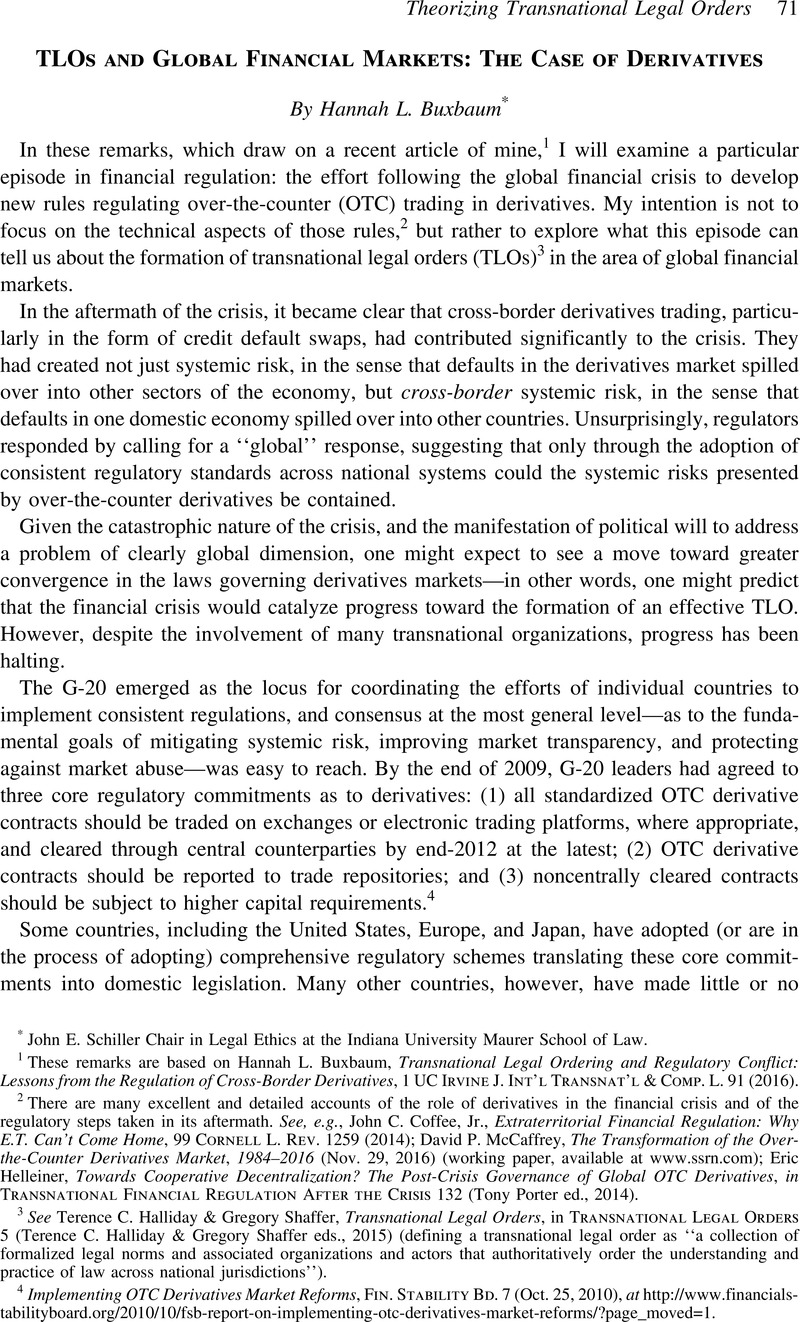No CrossRef data available.
Article contents
TLOs and Global Financial Markets: The Case of Derivatives
Published online by Cambridge University Press: 18 May 2017
Abstract

- Type
- Theorizing Transnational Legal Orders
- Information
- Copyright
- Copyright © American Society of International Law 2016
References
1 These remarks are based on Buxbaum, Hannah L., Transnational Legal Ordering and Regulatory Conflict: Lessons from the Regulation of Cross-Border Derivatives, 1 UC Irvine J. Int'l Transnat’l & Comp. L. 91 (2016)Google Scholar.
2 There are many excellent and detailed accounts of the role of derivatives in the financial crisis and of the regulatory steps taken in its aftermath. See, e.g., Coffee, John C. Jr., Extraterritorial Financial Regulation: Why E.T. Can't Come Home, 99 Cornell L. Rev. 1259 (2014)Google Scholar; David P. McCaffrey, The Transformation of the Overthe- Counter Derivatives Market, 1984–2016 (Nov. 29, 2016) (working paper, available at www.ssrn.com); Eric Helleiner, Towards Cooperative Decentralization? The Post-Crisis Governance of Global OTC Derivatives, in Transnational Financial Regulation After the Crisis 132 (Tony Porter ed., 2014).
3 See Terence C. Halliday & Gregory Shaffer, Transnational Legal Orders, in Transnational Legal Orders 5 (Terence C. Halliday & Gregory Shaffer eds., 2015) (defining a transnational legal order as “a collection of formalized legal norms and associated organizations and actors that authoritatively order the understanding and practice of law across national jurisdictions”).
4 Implementing OTC Derivatives Market Reforms, Fin. Stability Bd. 7 (Oct. 25, 2010), at http://www.financials-tabilityboard.org/2010/10/fsb-report-on-implementing-otc-derivatives-market-reforms/?page_moved=1.
5 The Dodd Frank Act: Five Years On, Int'l Swaps & Derivatives Ass’n 8 (July 20, 2015), at http://www.isda.org (ISDA Focus: Dodd-Frank).
6 Brummer, Chris, Post-American Securities Regulation, 98 Cal. L. Rev. 327, 359 (2010)Google Scholar.
7 15 U.S.C. § 8304 (2012). Section 722(d) further provided that U.S. law would apply to foreign swap activities that had “a direct and significant connection” with activities in U.S. commerce, or that were deemed evasive of U.S. law. 7 U.S.C. § 2(i) (2001).
8 Most importantly, EU and U.S. regulators agreed on a functional equivalence (substituted compliance) system in which certain market participants would be deemed in compliance with local requirements if they satisfied applicable requirements in their home jurisdiction. See, e.g., Commodity Future Trading Comm'n, Commodity Future L. Rep. 33644, The United States Commodity Futures Trading Commission and the European Commission: Common Approach for Transatlantic CCPs (Feb. 10, 2016).


